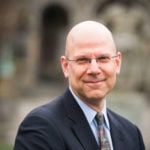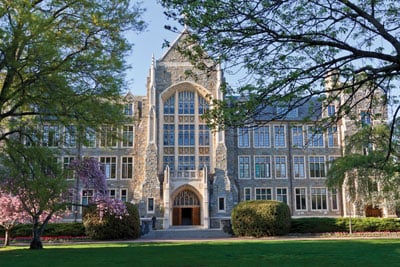2016 Leaders in Higher Education
THIS GUIDE IS NO LONGER ACTIVE. For the current FP Guide, click here.
Georgetown University,
Walsh School of Foreign Service
Service, Leadership, and Influence
“At our school, what happens in the classroom has resonance in the policy world,” says Joel S. Hellman, dean of Georgetown University’s Walsh School of Foreign Service (SFS). “Because we are in Washington, D.C., and because we have close engagement with policymakers on a day-to-day basis, our classes are really laboratories in dealing with global problems. And because of our location, what comes out of those classrooms has a broader impact.”

“Our classes are really laboratories in dealing with global problems. And because of our location, what comes out of those classrooms has a broader impact.” –Joel S. Hellman, Dean, School of Foreign Service (SFS), Georgetown University
Hellman has been serving as dean of SFS since 2015, following nearly 20 years on the front lines of development at the World Bank, grappling with some of the world’s toughest economic and political challenges. He led the World Bank’s work in the most challenging fragile and conflict-affected states and served as its first chief institutional economist. As a development practitioner, he has worked in nearly 50 countries across four continents.
“Our curriculum at SFS is oriented toward capstone experiences in which students take leadership roles in trying to solve problems under the mentorship of leading researchers, policymakers and practitioners who deal with pressing global problems,” says Hellman.
For example, former U.S. Secretary of State Madeleine Albright directs students in a crisis response policy exercise that simulates real-time crisis response by challenging students with unexpected changes over the course of the exercise. Students must present their policy responses to the nation’s first woman Secretary of State.
 Since its founding nearly 100 years ago, SFS has been committed to service—not just in international diplomacy, but as an approach to solving problems throughout the private and public sectors. Led by a faculty of both scholars and practitioners, SFS has become one of the world’s leading academic and research institutions. Its faculty members include scholars in political science, economics, history, and cultural studies, as well as professionals with experience and expertise in business, government, and the nonprofit sector.
Since its founding nearly 100 years ago, SFS has been committed to service—not just in international diplomacy, but as an approach to solving problems throughout the private and public sectors. Led by a faculty of both scholars and practitioners, SFS has become one of the world’s leading academic and research institutions. Its faculty members include scholars in political science, economics, history, and cultural studies, as well as professionals with experience and expertise in business, government, and the nonprofit sector.
“The value of an international affairs education is how cross-cultural understanding intersects with other core skills necessary to solve global problems,” says Hellman. “At SFS, we’re increasingly looking at the intersection of science and international affairs. We’re also looking at the role of the private sector in solving complex global challenges. And we are increasingly considering the importance of arts, culture, and narrative in shaping the way we view international affairs.”
SFS’s MS in Foreign Service, MA in Security Studies, Master of Global Human Development, and five regional MA programs have been drawing an increasingly sophisticated group of students with a wide range of career interests. “The skills that our students learn in diplomacy, negotiation, cross-cultural understanding, and more are skills that are increasingly in demand in every sector,” says Hellman. “This allows students to make a difference no matter what career path they choose.”
Master’s Degrees offered: See Program Directory
Contents
- 2016 Leaders in Higher Education
- Georgetown University, Walsh School of Foreign Service
- New York University School of Professional Studies, Center for Global Affairs
- University of Denver, Josef Korbel School of International Studies
- Johns Hopkins University School of Advanced International Studies (SAIS)
- National University of Singapore, Lee Kuan Yew School of Public Policy (LKY School)
- Webster University
- University of California San Diego, School of Global Policy and Strategy
- Texas A&M University, Bush School of Government and Public Service
- George Mason University, Schar School of Policy and Government
- University of Kent, Brussels School of International Studies (BSIS)
- The Citadel, The Military College of South Carolina: The Citadel Graduate College
- Columbia University, School of International and Public Affairs (SIPA)

